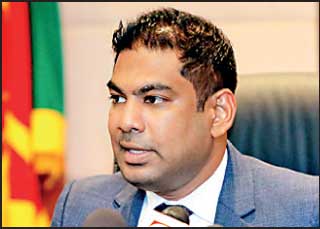Sunday Feb 22, 2026
Sunday Feb 22, 2026
Thursday, 28 September 2023 00:32 - - {{hitsCtrl.values.hits}}
 |
| Power and Energy Minister Kanchana Wijesekara |
Power and Energy Minister Kanchana Wijesekara said the Government has prioritised economic sustainability over political gain by committing to restructure State-Owned Enterprises (SOEs).
Govt.
Addressing various stakeholders including trade union leaders, civil organisation activists and journalists on Tuesday at the Finance Ministry on ‘Restructuring of Government Institutions for a New Development Approach’ he said restructuring SOEs is a critical factor to ensure financial discipline and establishing a stable economy.
“We only have the support of the International Monetary Fund (IMF) and other development agencies. We must remember that financial discipline is paramount in building our economy again to avoid any financial crisis in the future. If not, we cannot obtain any loans and aid from any foreign country or agency in future,” Wijesekera stressed.
The Minister also said that the Ceylon Electricity Board (CEB) and Ceylon Petroleum Corporation (CPC) must be restructured to overcome the financial burden it has on the overall economy.
“All the SOEs must be restructured. By transferring the powers of decision-making to the Government, the business operations must be allowed via officials to handle. We need to create a proper system to manage those enterprises by restructuring,” he added.
Wijesekera also addressed the staffing situation within the CEB and CPC, revealing that there are over 4,000 vacancies in these institutions, surpassing the approved staff count. However, he emphasised that the existing workforce is sufficient to maintain operations and provide essential services.
As per the Minister, CPC has 3,292 approved staff positions, but currently employs 2,100 individuals, resulting in 1,192 vacancies, whilst CEB with 24,000 approved staff positions, employs 21,000 workers, and has brought in 3,000 external hires for specific tasks. This leaves a gap of 3,000 additional employees needed to meet the approved staff cadre.
Wijesekara acknowledged the possibility of utilising these vacancies for political advantage, particularly in the Matara District, but underscored that such a move would be contrary to the Government’s policy.
“The priority remains the integrity and efficiency of these institutions in furthering sustainable economic development,” he explained.
The University of Colombo Department of Economics former Head Prof. Sirimal Abeyratne weighed in on the situation, emphasising the critical role that restructuring plays in driving economic growth.
He highlighted that this process must be accompanied by positive transformations in areas such as good governance, law enforcement, and societal attitudes.
Prof. Abeyratne pointed out that SOEs worldwide often grapple with issues like financial indiscipline, lack of transparency, inefficiency, resource wastage and corruption. “These challenges are not unique to Sri Lanka but there is a necessity of restructuring.”
He emphasised that this transformation is a vital step in overcoming the prevailing economic crisis, and urged for a united effort from the workforce towards the betterment of the country.
“The current Government’s decision to prioritise sustainable economic development over short-term political gains represents a significant shift in approach. By addressing the structural issues within these SOEs, Sri Lanka takes a crucial step towards building a more robust and resilient economy for the future,” Prof. Abeyratne said.
President’s Trade Union Director-General Saman Ratnapriya highlighted the potential benefits of restructuring SOEs for enhanced efficiency and effectiveness in service delivery.
He emphasised that countries with less Government involvement in business tend to boast more developed economies, in contrast to those heavily intertwined with Government business.
Ratnapriya revealed a staggering expenditure of Rs. 333 billion in public funds from 2010 to 2020 to sustain the Sri Lanka Railway Department.
He emphasised that if operated with a profit-oriented approach, the SOEs could have potentially saved nearly Rs. 30 billion annually.
Regarding queries about potential restructuring in the health and education sectors, he stated that there are no concrete plans in place.